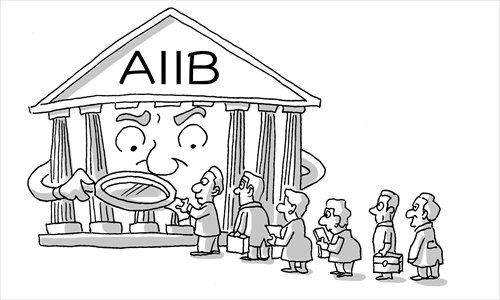High standards would suit AIIB’s lofty goals

Illustration: Liu Rui/GT
The Asian Infrastructure Investment Bank, known as the AIIB, made an important stride toward establishment by having its Articles of Agreement (AOA) signed in Beijing on Monday. What standards the AIIB will apply to its lending business has caused curiosity and concern.
In the eyes of some Western countries, the AIIB's standards, which may be lower than those of the World Bank or other multilateral development banks (MDBs), will not only compromise human rights in the borrowing countries, but also give the AIIB undue advantage over other MDBs. These concerns are untenable.
China, as the initiator and lead shareholder of the AIIB, has vowed for high and feasible standards in infrastructure financing.
The AIIB Interim Secretariat has engaged internationally recognized experts to design the AIIB's standards and safeguard policies. The AIIB's standards aim high and remain feasible.
Living up to high standards benefits both the AIIB and China.
First, maintaining high standards is in China's own interest, as it reinforces China's economic and trade upgrading campaign. China is striving to climb up the value chain by reforming its heavily polluting industries. For a Chinese company to win the bid of an AIIB-financed project, it must conform to the high standards that apply to all phases of the project. That in turn will compel the company to carry out comprehensive transformation and upgrading in terms of technology, management and so forth. Chinese companies with a competitive edge in industries such as railways, electricity, telecommunication, construction, equipment and machinery should be pioneers to make the changes happen.
Second, maintaining high standards facilitates the AIIB's financing needs in the global capital market. MDBs raise capital by issuing bonds in the international market; thus sustaining a good credit rating record is crucial to MDBs' fund raising ability.
With an authorized capital stock of only $100 billion, the AIIB will undoubtedly turn to the global capital market to meet the need for $8 trillion to finance infrastructure construction in Asia. Satisfying high standards will help the AIIB earn a good credit rating in the international capital market and borrow at low cost.
Third, high standards facilitate cooperation between the AIIB and other MDBs. Co-financing by a syndicate of MDBs is common practice in international project financing. Capital is thereby catalyzed in order to serve market needs. All MDBs have their own standards or safeguard policies. Many of the standards have undergone overhauls in recent years and have displayed a trend of convergence. That trend shall be observed by the AIIB, as a common standard will streamline co-financing by the AIIB and other international development banks.
In designing its standards, the AIIB may consider drawing from the experience of the World Bank, which has been a leader in the area for a long time.
The World Bank started assessing the impact of its projects on environment and society as early as the 1970s. The current safeguard policies have been in effect since 1997, after rounds of reviews and updates. Consisting of three groups of policies on environment, society and law, the safeguard policies are binding on borrowing countries during the duration of World Bank-invested projects.
In July 2014 the World Bank issued a proposed Environmental and Social Framework which aims to update the current safeguard policies as time goes on and the situation changes.
The draft framework has many good points. Among others, responsibilities between the World Bank and the borrowing countries are delineated clearly for the first time; the World Bank's review and supervision resources are allocated in a risk-based manner; World Bank standards are aligned with those of other MDBs; and emerging issues, like climate change, human rights, and prior and informed consent of indigenous peoples, are duly reflected.
While the pros of World Bank standards should be learned, their cons must not be ignored.
There have been numerous reports blaming World Bank-financed projects for environmental deterioration, forced immigration, low compensation for affected people and other problems. Some standards are burdensome and irrelevant, making the projects costly and prolonged.
The AIIB should draw on both the experience and lessons of the World Bank. The AIIB's standards should be both high and feasible. The standards must be applied in a national context, and in a project-specific manner. Their implementation must be assessable in order to avoid window-dressing. Stakeholders, including the AIIB and borrowing states, should be held liable for standards violations.
The author is assistant professor at Beijing Foreign Studies University. opinion@globaltimes.com.cn
Read more in Special Coverage: